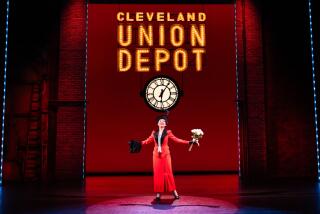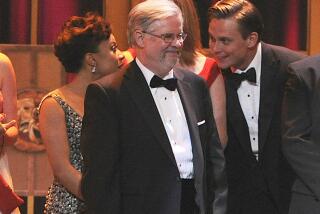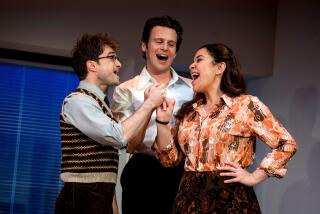Mark Rylance breathes life into ‘Boeing-Boeing’
IN THE “Say what?” department, this statement ranks up there: “If Camoletti had written a tragedy of this quality, he’d be up there with Pinter.”
Few people could get away with comparing Marc Camoletti, the French playwright of the creaky ‘60s sex farce “Boeing-Boeing,” with the great existentialist Harold Pinter. But then few people have the pedigree and nerve to make the claim more than Mark Rylance, the protean British actor and former artistic director of Shakespeare’s Globe theater in London.
Indeed, if the statement is not laughable on the face of it, a good deal of the revisionist credit must go to the 48-year-old Rylance. His performance as Robert, a virginal, sad-faced Midwesterner caught up in the sexual machinations of Bernard, his old college buddy whom he visits in Paris, has helped to make the revival the surprise hit of the season.
Though “Boeing-Boeing” ran for only 23 performances when it originally bowed on Broadway in 1965 (the same year it was made into a flop Jerry Lewis movie), this new production, an import from the West End, disarmed skeptical critics and received six Tony nominations, including best revival, leading actor in a play (Rylance), direction of a play (Matthew Warchus) and featured actress in a play (Mary McCormack). Not bad for a comedy once dismissed as a smirky joke about a Lothario balancing affairs with three unwitting stewardesses -- Italian, American and Germanic -- dependent on time schedules and the complicity of a long-suffering maid and hayseed friend.
Writing in New York magazine, critic Jeremy McCarter praised Rylance’s deadpan performance as “one weirdly inventive, punishingly funny moment after another. . . . Soft-spoken and bow-tied, this Robert could be a cousin to the sad-eyed Stan Laurel, resigned to absorbing the kick that’s sure to arrive any moment now.”
Although Rylance says his performance as Robert owes more to Art Carney (and his 7-year-old nephew) than to Laurel, the actor has taken more than his share of kicks in the course of a career marked by gutsy moves and controversy. His larger public profile began with a hailed performance as Hamlet with the Royal Shakespeare Company in 1988 and continued through an occasionally stormy decade at the helm of the reconstructed Globe. He brought that company’s productions to the United States frequently, including an all-male “Twelfth Night” (seen at UCLA’s International Theatre Festival in 2003) that featured his cross-dressing turn as the Countess Olivia. He has also starred in such films as Patrice Chéreau’s psychosexual drama “Intimacy” and was recently featured as Thomas Boleyn in “The Other Boleyn Girl.”
Last year, he caused a dust-up in the British press via his proclamation (with actor Derek Jacobi) and his play, “I Am Shakespeare,” questioning the true authorship of the Shakespeare canon. It calls for new research into the long-debated question as to whether Christopher Marlowe, Francis Bacon, Edward De Vere or the Countess of Pembroke and the Earl of Oxford should be credited with some of the plays. The argument “is to Shakespearean scholarship what intelligent design is to evolution,” sniffed one critic.
Sitting in his dressing room at the Longacre Theatre, the cynosure of all this activity is as laid-back as his present alter ego, Robert. After all, they both have Wisconsin in their background. Rylance was brought to the U.S. at age 3 when his father, David Waters, was named headmaster of Choate in Connecticut. Six years later, Waters moved his family to Wisconsin to helm the University School of Milwaukee. At that prep school, young Mark began to act, playing Hamlet (to his father’s Grave Digger) and Puck. That led to a scholarship to attend London’s Royal Academy of Art and, after graduating, to stints with the Royal Shakespeare Company and the Royal National Theatre, where, in 1987, he met his wife, musical director and composer Claire van Kampen.
Fighting off a cold and sipping a cup of tea, Rylance is disarmingly honest and funny as the conversation easily goes from the philosophical to the profane. Rylance said he’d always wanted to play the clowns and fools in Shakespeare -- Dogberry, Touchstone -- but felt that, as artistic director of the Globe, he was obliged to take on more authoritarian roles. Thus, he jumped at the chance to play Robert when approached by Warchus.
“Whether he’s playing Shakespeare or ‘Boeing-Boeing,’ Mark brings this authentic rigor to the role,” says Warchus, who has directed Rylance in both contemporary drama and classics, including Rylance’s Olivier Award-winning performance as Benedick in “Much Ado About Nothing.” “It’s a farce, but it’s romantic as well, and Mark is able to locate the heart in the piece and draw in the audience because his truth is so magnetic. He’s not playing it for laughs, and that’s why he’s so funny.”
‘The wild Steve McQueen type’
UNSURPRISINGLY, Rylance sees the amorous convolutions of “Boeing-Boeing” as nothing less than classic. “It’s man’s careful plans meeting these emotional weather patterns which messes everything up,” he says. “Then Pan, as the source of the panic, is shown in the end to be a good force. It’s not dissimilar to what happens in all the Shakespeare comedies -- this terrible panic which turns out well for almost everybody.”
As to the role of willful determinism versus chance in his own life and career, Rylance says the poles have long been in a sometimes uneasy, sometimes complementary, alliance. “I’ve always admired the wild Steve McQueen type of characters, the person who seems to be closest to their ‘indigenous souls,’ comfortable with their fate, even if that fate is going to land them bouncing a tennis ball in a solitary cell for a while. There is something heroic and Byronesque about recklessly and heedlessly jumping over a fence and landing on a motorcycle and taking off.”
Rylance says he’s more subtle in his application of nerve. Although he has never veered from risk -- at 30, he sold his flat and moved with his wife and her two children into a trailer to finance their own theater company, Phoebus Cart -- he has rarely been entirely spontaneous either. “It may be from an intensive imagination of what might happen if I jumped and landed wrong,” he says with a laugh. “McQueen, I’m sure, never thought about what would happen if he landed wrong.”
But, adds Rylance while rakishly cocking his black “Sinatra” hat on his head, he is learning to be more open to the “happy accidents” that life may bring him. “At this stage, I feel like my particular thing is not to push,” he says. “I didn’t really plan on this comedy and the plans I did have weren’t nearly as good as what was meant to happen to me. I’m getting better at just allowing life to take its own course, hopefully bring in something new and fresh along with the panic.”
More to Read
The biggest entertainment stories
Get our big stories about Hollywood, film, television, music, arts, culture and more right in your inbox as soon as they publish.
You may occasionally receive promotional content from the Los Angeles Times.






